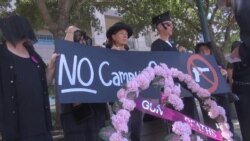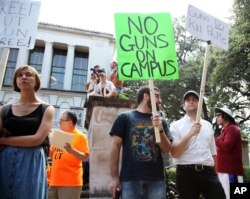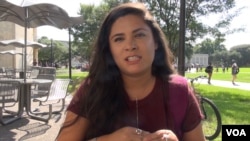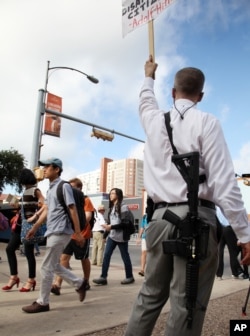Classes are now underway on state university campuses in Texas, where a new law went into effect last month allowing anyone with a concealed weapon license to bring a handgun on to campus, as long as it remains concealed.
At the University of Houston, many students, like Ali Rajwani, express little concern.
“I am pretty indifferent about it,” Rajwani said. “It is not like I think ‘Oh, God, I am going to be shot on campus!’ I don’t feel that in any way. I don’t really feel any change at all.”
Since January, the same law has allowed open carry of handguns — that is, not concealed, but properly holstered — in most other public places, with little noticeable impact.
State officials report only around 4 percent of the more than 27 million Texas residents have obtained a concealed weapon permit.
The Texas Attorney General’s Office has responded diligently to complaints from around the state involving public buildings that have restricted firearms. This week, the state sued Waller County for not allowing citizens with a concealed weapon license to bring guns into the courthouse.
'No-gun zones'
University presidents and professors argue that campuses should be given special status as “no-gun zones,” but the Texas legislature did not agree.
The law does allow schools to establish limited no-gun areas on campuses.
Some students worry about the potential problem of having guns on campus, while others think properly licensed, armed students could prevent crimes.
Sitting at a picnic table outside the University of Houston library, sophomore education student Allie said, “The university is a stressful place, and people are not always mentally stable, and, with weapons involved, it is just a recipe for disaster.”
But Thomas Wanko, who studies marketing, said, “I feel safer on campus knowing there are people who have applied for the license and are legally able to carry a weapon. I feel safer in case anything happens.”
Wanko said he has friends who will be carrying their handguns on campus and that he plans to take the test and get a license as well.
The University of Houston police department has posted information on policy and procedures online, but otherwise the university is remaining low key on the issue.
Professors worried
At the University of Houston-Downtown, political science professor David Branham tells VOA that his colleagues, for the most part, oppose campus carry, partly because conflicts between young people can sometimes become heated and someone with a gun could make a tragic decision in the heat of a moment.
Branham and his colleagues also worry that they could be vulnerable.
“What they are worried about is the student who is on academic probation, who is getting an ‘F’ in your class and they want you to change the grade, and you are refusing to change the grade because it would not be fair to the rest of the students, and all of a sudden, a gun becomes part of that equation," he said. "I think that is what professors are worried about.”
The strongest opposition to the campus-carry policy is at the University of Texas in Austin, where last week a group of students handed out sex toys, which are banned on campus, to make the point that dangerous guns are allowed, while items that would be of little use for someone contemplating violence are forbidden.
At least one professor left the university last year citing the new law as the reason and a group of other faculty members unsuccessfully sued the state to stop the implementation of the law on campus.
Mass shooting
The issue is especially sensitive at UT/Austin because, 50 years ago, it was the scene of the first mass shooting on a U.S. college campus; sniper Charles Whitman killed 16 people, mostly from his perch atop the tower that looms over the center of the campus.
Private citizens, including many students, fired hunting rifles to keep Whitman from taking careful aim and were credited with saving lives. However, those bullets also endangered the police officers who went to the tower platform to shoot Whitman.
One of those officers was Ramiro Martinez, who is now retired from law enforcement.
Visiting the campus last month, Martinez told VOA he is opposed to having guns on campus.
“I believe in the Second Amendment,” he said, referring to the amendment of the U.S. Constitution that protects the right of citizens to own firearms. “I believe in it, but I also believe in common sense and there is a lot of common sense lacking right now.”
Many active police officers and commanders agree with his assessment, noting the difficulty open carry imposes when officers arrive at the scene of a shooting to find more than one person holding a gun.
Issue debated
Sabine Wakim, who teaches debate at the university, has used the gun-rights issue in her classes, staging debates over Second Amendment rights.
The problem, as Wakim sees it, is that gun proponents truly believe that armed citizens can stop violent criminals and terrorists, whereas those opposed to guns believe having guns around is likely to cause incidents of violence.
“If we can understand where each one of these sides is coming from, we can have better conversations about how to effectively protect ourselves but also stop these things from happening in the first place,” she said.
But much of the dialogue now is dominated by the more extreme elements on each side, with most people taking no stand on the issue.
Unlike state schools, private universities in Texas are not obligated to allow armed students on campus and all but one of them have chosen to opt out.









